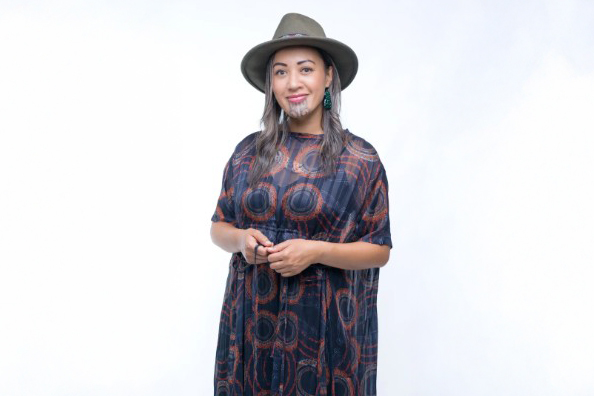Fluent te reo speaker James Barnes straddles the Māori and Pākehā worlds, as well as the shared space between, armed with well-honed skills developed from a rare set of experiences for a Pākehā.
It’s a skill set that has helped the 39-year-old (of English and Irish ancestry) as he’s worked towards a He Waka Hiringa degree (Master of Applied Indigenous Knowledge) at Te Wānanga o Aotearoa.
Hamilton-based James, the only Pākehā on the course at Mangakōtukutuku campus, grew up in Tauranga and Mt Maunganui with his twin brother amongst the iwi of Ngai Te Rangi, Ngāti Pukenga and Ngāti Ranginui.
“It’s been a real privilege,” he says of his immersion in te ao Māori over the years since his childhood education at Te Kōhanga Reo o Ngāpeke and Te Kura Kaupapa Māori o Otepou, describing as “stark” the contrasts and ”culture shock” he experienced when moving into more Pākehā learning.
His degree focus has been on learning whaikōrero (the art of Māori speechmaking heard at pōhiri and other formal occasions) and creating a bilingual resource of 10 original tauparapara (incantations to begin a speech) based on readily available writings in The Polynesian Society Journal.
James recently did a presentation on his study as part of the final assessment process for his He Waka Hiringa degree.
He and his twin Alex’s te reo immersion began as their father worked at a local marae in Tauranga. His Pākehā parents were part of the political awakening in Aotearoa around the tangata whenua experience of raupatu (confiscation) during the 1970s and 1980s, including greater appreciation of Te Tiriti o Waitangi and te reo Māori.
This upbringing between worlds led James to growing the reo he knew from childhood days as well as understanding more about his Pākehā heritage.
He has carried on learning, and eventually teaching, te reo as an adult, working nowadays for Raukawa FM as a Māori language programmer and also as a kaiako and mentor in te reo with Culture Flow.
James says he was drawn to the topic of whaikōrero for his Masters as it was a subject he’d been interested in since school days and he’d subsequently been mentored in the topic.
“The aim of my work is to inspire people generally to give these tauparapara I’ve written a go,” he says.
James, who was awarded a scholarship for this year by Te Kōhanga Reo National Trust, notes more and more Pākehā are learning te reo, with some appearing to want help to understand and define their Pākehā character through things Māori. But he says it’s also important for Pākehā to understand and appreciate the culture of their own Pākehā history which has linked them through Te Tiriti to New Zealand and also to overseas.
“The Māori world is moving quickly toward self re-intergration and adjusting and responding to colonisation. I would like my Pākehā people to do the same.
“Me maranga tahi te iwi Pākehā i te whakaturamoe o te raupatu. Kia ora mai tātau katoa. (We as Pākehā should also awaken from the spell of colonisation, so that we can all collectively heal.)”
It feels like kōrero and whakaaro from people like James will be important in helping articulate the way in which Māori and Pākehā inhabit and relate to each other in their various spaces.




































